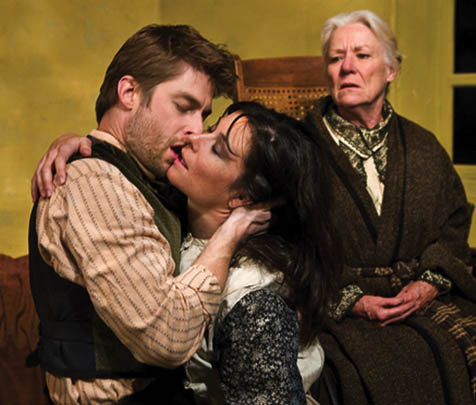Therse Raquin
At Ensemble Theatre Company, Saturday, February 2. Shows through February 24.

The scene is a cramped one-room apartment near the Passage du Pont Neuf in mid-19th-century Paris. It looks like a painting by Edgar Degas, or a set by the inspired scenic designer Harry Feiner. Three middle-class Parisians live there: Therse (Lauren Lovett), her sickly husband Camille (Michael Matthys), and his mother, Madame Raquin (Barbara Tarbuck). The curious twist is that Therse and Camille are cousins trapped in a pitiful arranged marriage.
When the curtain rises, Therse is seated motionless, staring off into space while a handsome aspiring artist, who is also Camille’s good friend, Laurent (Jamison Jones), paints a portrait of Camille. An adoring Madame Raquin looks on approvingly. From there the routine continues. Every Thursday night, three friends come over to play dominoes-a bureaucrat, Grivet (Paul Tigue), a retired police detective, Michaud (Edward K. Romine), and his niece, Suzanne (Jessica Spaw).
Seemingly a portrait of bourgeois domesticity, in Therse Raquin a strong current, like those in the nearby River Seine, runs underneath. As soon as they are alone, Therse and Laurent engage in passionate sex. Lighting designer J. Kent Inasy dims the light so much that the audience strains to see. Something dark and foreboding is about to occur.
Shortly afterward, the three young people go on an excursion to the River Seine and Camille mysteriously drowns. Madame Raquin is so overcome with grief that her good friend Michaud suggests Therse and Laurent marry to “comfort and bring her grandchildren,” an irony not lost on the audience. Jones and Lovett play out their descent into madness while Madame Raquin, overhearing the truth during a heated argument, suffers a stroke. She lives on in silence with the murderers in her midst. The guests continue to play dominoes in the disheveled and claustrophobic apartment, unaware of the degradation taking place.
mile Zola wrote Therse Raquin as a novel describing the seamy side of life, which he then adapted into a play. It was a reaction against Romanticism, and heralded a new form that he called Naturalism. The story has had numerous manifestations in theater and film, the latest of which is Nicholas Wright’s insightful adaptation of Zola’s work, which has here been admirably directed by Jonathan Fox. Billed as a “psychological thriller,” the Ensemble Theatre Company delivers on this introspective portrait of two lovers driven by their lust into murder and madness. It makes for a fascinating night at the theater.



